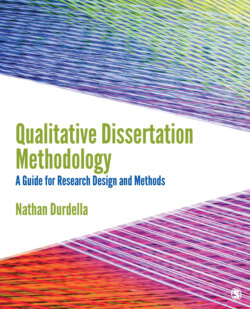Читать книгу Qualitative Dissertation Methodology - Nathan Durdella - Страница 19
На сайте Литреса книга снята с продажи.
Select a research purpose connected to qualitative research goals.
ОглавлениеThe overriding goals of qualitative research—description, verification, interpretation—all tend to offer a broad range of opportunities to develop a research purpose and question for a study. If you randomly sampled (ironic, yes?) dissertations that use a qualitative approach, you would find that they share methodologically characteristics: they explore, describe, detail, and interpret facets of human social life—what people do, say, make, and believe. The emphasis here is on understanding experiences—collective and individual—of the human condition and learning directly from folks who form the participants of your study. Across social contexts and settings—from institutions, communities, families, and groups—qualitative research aims toward in-depth synthesis, analysis, and interpretation of what it means to live as members of groups and in human societies.
Until you move into specific research traditions, the products of qualitative inquiry often look alike. That is, they generally share similar language and focus that can be seen across research purpose statements. For example, Bailey (2012, p. 5) presents a dissertation research purpose “to examine Black student involvement and cultural leadership development through the conceptual lens of validation, which reaches beyond the Eurocentric conceptualization of student involvement . . . and examines the validating experiences of underrepresented students.” Bailey went on to describe the study’s rationale in the following way: “While there is much research on the experiences of Black student leaders at Historical Black Colleges and Universities (HBCUs) and [Predominantly White Institutions] PWIs, there is a lack of research of these students at other institutional types. Specifically, there is a lack of research on Black student leadership experiences at Hispanic-Serving Institutions (HSIs), particularly HSIs that are commuter campuses” (p. 5). Meanwhile, Bertone (2016, p. 6) focuses her dissertation study on “the relationship between growth mindset and the transfer experience for community college students.” In her dissertation study, Michel (2014, p. 4) designed a purpose “to explore the social preparedness and familial support experiences of first-year, first-generation, low-income Latino college students during their transition from an urban charter high school to regional urban public universities in Southern California.” Do you see patterns in what Bailey, Bertone, and Michel set out to do in their studies?
The language and focus of qualitative research converges on exploring and describing the experiences of a social or cultural group. You can see from these doctoral student samples that a common set of terms emerges over and over—what repeats and shows up again and again in these research purposes? A clear focus on “experiences” of specific groups—Black students at HSIs; first-year, first-generation, low-income Latino students; and transfer students—permeates their studies that explore experiences and relationships in social settings. Two student samples further illustrate the general tendency to design exploratory studies of social groups in qualitative research. For her part, Peralta (2014, p. 5) describes how she designed a dissertation study that examined “the academic experiences of Latino middle school students who transition from an alternative school setting to a traditional school setting and how these experiences shape their meaning of academic success.” And Randolph (2014, p. 4) framed her dissertation study as an examination of “undergraduate research experiences of students of color.”
Facilitating voice or emancipating local groups, improving conditions and supporting change in or preserving family practices, updating policies and enhancing protections, uncovering implicit or hidden meaning, establishing local connections and advancing your career, and many, many more goals frequently undergird your interest in pursuing a specific line of inquiry in a dissertation study. In general, dissertation research goals can be seen as connected to one or more of the following sources:
Social science research goals (see above)
Qualitative research approaches (see Chapter 3 and qualitative research design and methods texts)
Discipline-specific goals (consult faculty and disciplinary association representatives)
Program outcomes (access program documents and consult instructional leaders in the program)
Individual study purpose and goals (review research published in the field)
Personal goals and interests of researchers (engage in self-reflection and ask peers for feedback)
Reflect on Research Goals in Your Field
Do a quick self-assessment of what you know about research goals unique to your field.
While general social science research and discipline- and program-specific goals and outcomes are important, what you hope to do and accomplish in your study is central to how you frame your research problem, purpose, and questions. In fact, what you hope to accomplish appears formally in your research purpose, where you describe what you will do in your study and what you hope to accomplish with your study. Your personal goals for investigating a phenomenon often drive initial decisions about a topic and focus for your dissertation study. As your personal goals intersect with broader research currents, they tend to be interpreted and filtered for your study. For example, emancipatory research outcomes are associated with critical paradigms. Therefore, it is important to leverage the guiding principles and specific assumptions of the various approaches and work with them to structure your study.
